
From Apr 1, 2026, I’ll launch my own lab at Tohoku University as an Assistant Professor!
I’m happy to host applicants for the JSPS International Postdoc Fellowships.
If you’re interested in mathematical models of human history, feel free to DM me!

From Apr 1, 2026, I’ll launch my own lab at Tohoku University as an Assistant Professor!
I’m happy to host applicants for the JSPS International Postdoc Fellowships.
If you’re interested in mathematical models of human history, feel free to DM me!

Me at the RIKEN Center for Brain Science, my new place of work!

Me at Haha no Shirataki, a gorgeous waterfall near Mt. Fuji. It's pictured half-frozen, making it outstandingly cool
Happy to announce I started a postdoc with @watarutoyokawa.bsky.social at RIKEN-CBS! 🎉
I'm absolutely thrilled to be here (and not just because it's easy to find great waterfalls)
For this position, I'm broadening my research to include more interactive and naturalistic social learning settings 🧠
I am hiring a postdoc for a DFF-funded project on social influence, and the decision processes that fuel rich-get-richer dynamics in the online/offline world. The position is for up to a year, competitive Danish salary, remote work possible. Interested or know somebody? DM me or share!
01.12.2025 08:29 — 👍 18 🔁 24 💬 1 📌 0

Other highlights of the day included the cockiest slide I’ve made in my life, and my hat being almost the right size
25.11.2025 17:32 — 👍 15 🔁 0 💬 0 📌 0
Over the moon to announce that, as of last Friday, I’m officially #PhDone! I’d like to thank everyone who supported me along the way, including, but not limited to, my amazing supervisor @thecharleywu.bsky.social, and all members (past or present) of the HMC lab and the @velezcolab.bsky.social 🎓
25.11.2025 17:32 — 👍 48 🔁 2 💬 7 📌 3
My Lab at the University of Edinburgh🇬🇧 has funded PhD positions for this cycle!
We study the computational principles of how people learn, reason, and communicate.
It's a new lab, and you will be playing a big role in shaping its culture and foundations.
Spread the words!
Don't miss it!
Submit your abstract for our Satellite Symposium on Computational Neuroscience to celebrate 20 years Bernstein Center for Computational Neuroscience Göttingen!
Deadline for your abstracts is August 17!
Participation is free!
Join us in Göttingen on Oct 15!
Happening today after lunch! Stop by W-213 (conveniently placed at the very entrance of the salon, near fresh air!) to hear about positivity biases across individual and social learning #cogsci2025
02.08.2025 18:56 — 👍 19 🔁 1 💬 0 📌 0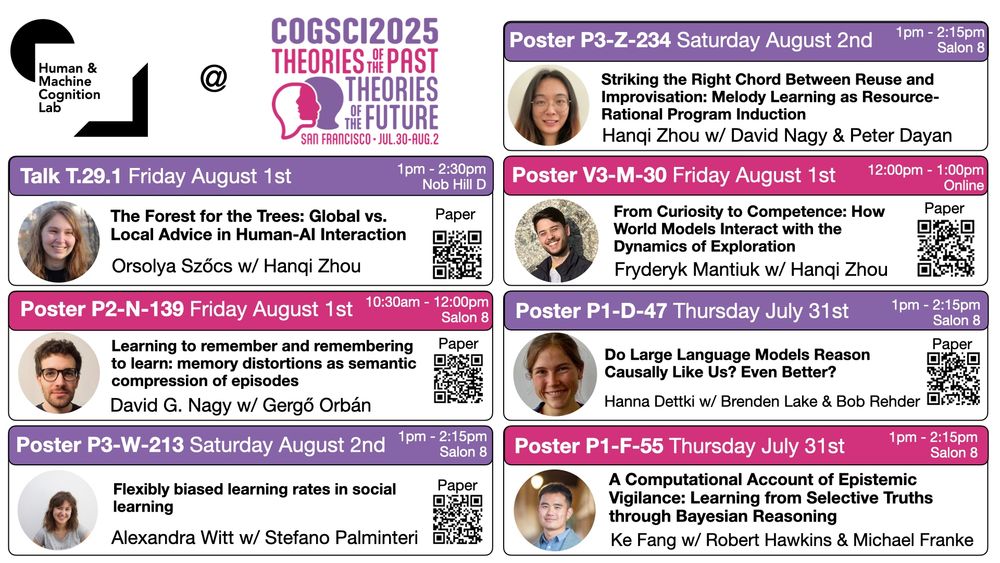
Proud of the work from hmc-lab.com & collaborators @ #CogSci2025 this year, but sad I cant be there myself
@hanqizhou.bsky.social @davidnagy.bsky.social @alexthewitty.bsky.social @stepalminteri.bsky.social @brendenlake.bsky.social @kefang.bsky.social @rdhawkins.bsky.social @meanwhileina.bsky.social
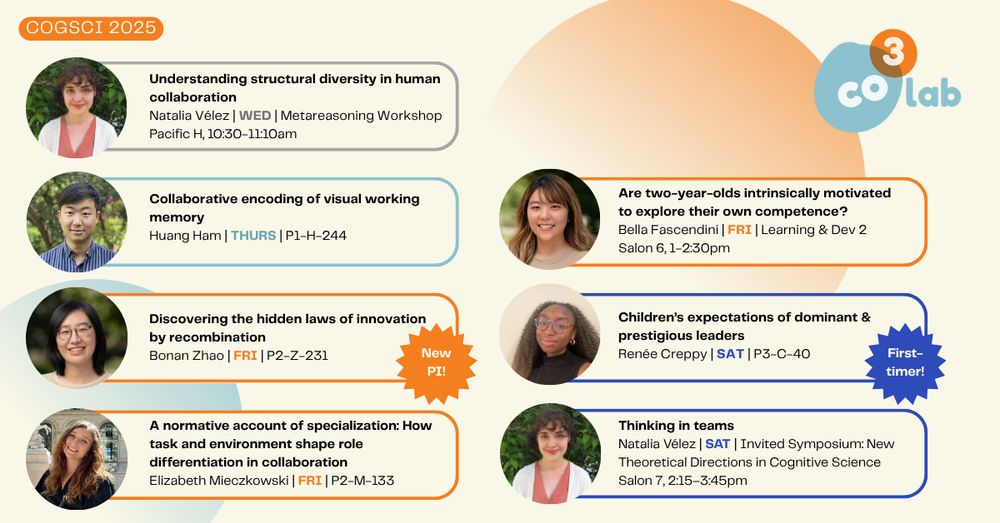
A lineup showing upcoming talks and posters for the CoLab at CogSci 2025. Wednesday Natalia Vélez: Understanding structural diversity in human collaboration Metareasoning Workshop, Pacific H, 10:30-11:10am Thursday Huang Ham: Collaborative encoding of visual working memory P1-H-244 Friday Bonan Zhao (new PI!): Discovering hidden laws in innovation by recombination P2-Z-231 Elizabeth Mieczkowski: A normative account of specialization: How task and environment shape role differentiation in collaboration P2-M-133 Bella Fascendini: Are two-year-olds intrinsically motivated to explore their own competence? Learning & Development 2, Salon 6, 1-2:30pm Saturday Renée Creppy (first-timer!): Children’s expectations of dominant and prestigious leaders P3-C-40 Natalia Vélez: Thinking in teams Invited Symposium: New Theoretical Directions in Cognitive Science Salon 7, 2:15-3:45pm
The CoLab is headed to #CogSci2025!! 🥳 Here's where to find us!
29.07.2025 17:15 — 👍 33 🔁 9 💬 0 📌 3Thrilled that our paper on the mechanisms underlying social learning strategies is out! First big paper from my @erc.europa.eu & @kawresearch.bsky.social funded group. More to come! I'm currently looking to recruit two post docs, get in touch if you find this line of research interesting.
23.07.2025 11:41 — 👍 69 🔁 28 💬 0 📌 3This was so fun! Thanks to everyone for coming, presenting, and exchanging ideas! :)
24.07.2025 15:17 — 👍 6 🔁 0 💬 0 📌 0
Delighted to announce our CogSci '25 workshop at the interface between cognitive science and design 🧠🖌️!
We're calling it: 🏺Minds in the Making🏺
🔗 minds-making.github.io
June – July 2024, free & open to the public
(all career stages, all disciplines)
Taken together, we find that learning rate biases are more flexible than expected, and especially flexible (and adaptive) in social learning settings. Thanks for reading this far, and since you already put in all this effort, consider giving the full paper a read! :)
26.05.2025 11:30 — 👍 3 🔁 0 💬 0 📌 0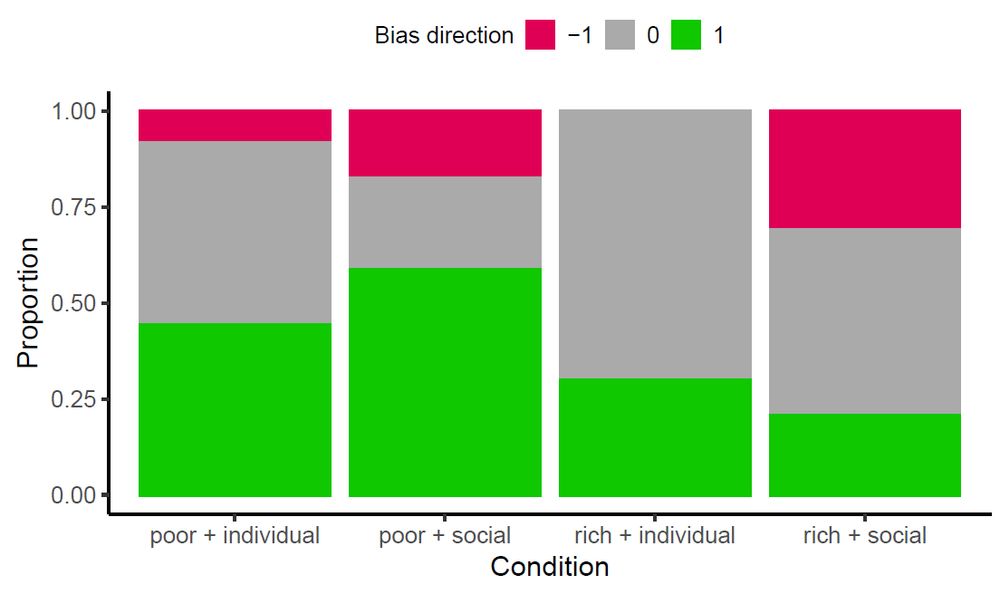
Bar chart showing the proportion of participants best fit by an unbiased learning model vs. positivity- and negativity-biased participants (determined by the difference in bias in participants best fit by a biased learning model). Proportions vary across conditions, with the highest proportion of positivity bias in social + poor, followed by individual + poor. Individual + rich has the highest proportion of unbiased participants (but no negativity biased participants), while social + rich has the highest proportion of negativity-biased participants.
We also find that bias isn't as stable as we expected: while there is still a significant positivity bias in individual + rich, we also find a high proportion of unbiased learners. Participants changed their bias between conditions, rather than being consistently positivity-(or negativity-) biased.
26.05.2025 11:30 — 👍 2 🔁 0 💬 1 📌 0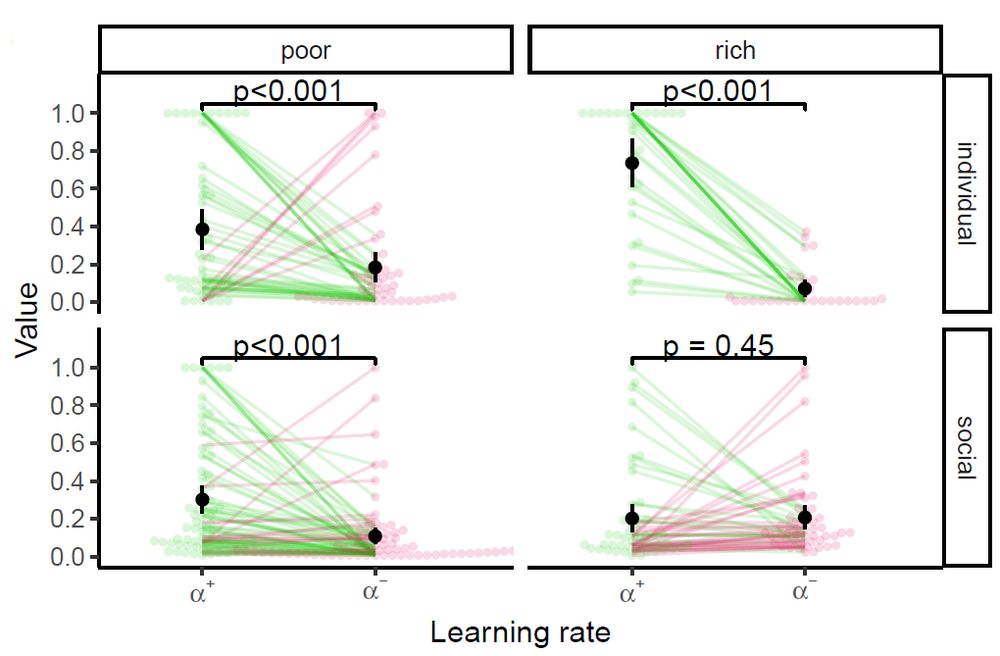
Beeswarm plots comparing positive and negative learning rates across conditions. The positive learning rate is significantly higher than the negative learning rate in poor and rich environments for individual learning, and in poor environments for social learning. There is no significant difference between learning rates in rich environments for social learning.
Participants were significantly positivity-biased in both individual conditions (matching previous findings), but they were only positivity biased in poor environments for social learning, while we found no significant bias in rich environments (where positivity bias is maladaptive).
26.05.2025 11:30 — 👍 1 🔁 0 💬 1 📌 0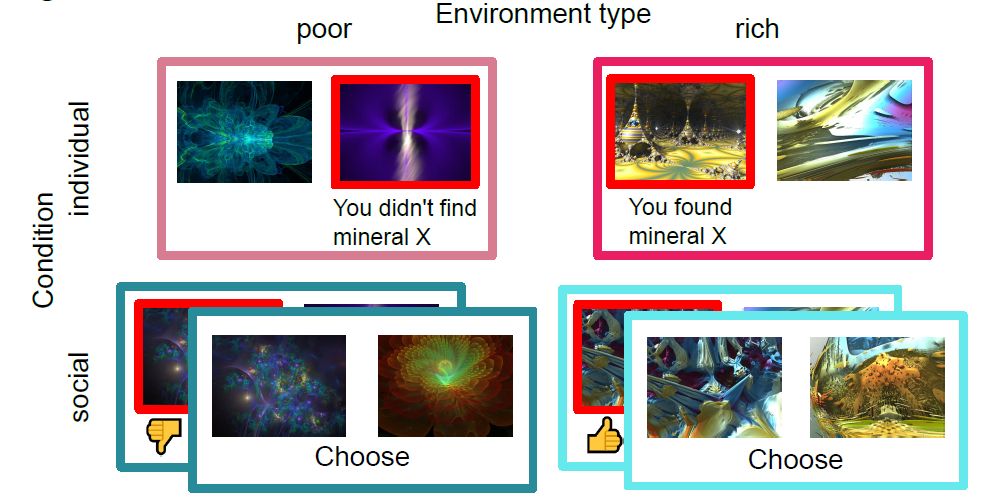
Experiment design: participants went through poor and rich environments for both individual and social learning conditions. In the individual learning condition, they made choices and received direct feedback. In the social learning condition, they observed multiple reviews, before making one choice.
We then ran a within-subjects 2x2 design as an online experiment. Each participant completed two armed bandits in rich and poor environments, and while learning socially or individually.
26.05.2025 11:30 — 👍 1 🔁 0 💬 1 📌 0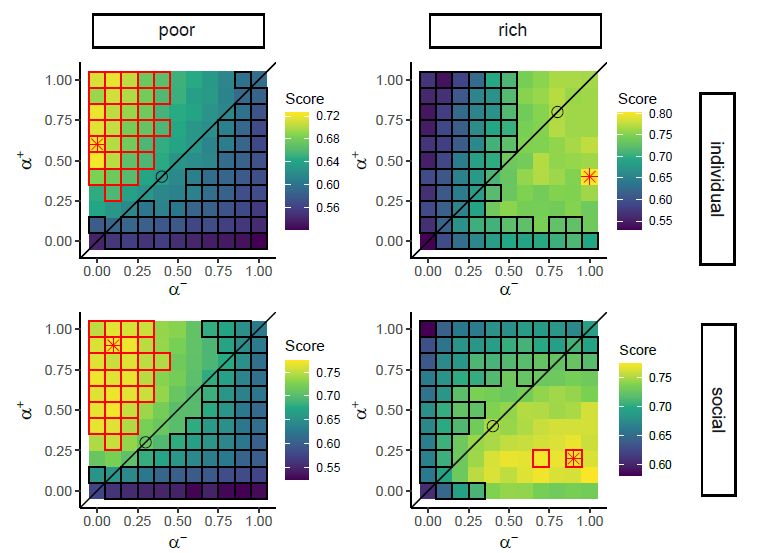
Simulation results across poor and rich environments, and individual and social learning. Regardless of learning type, positivity biased agents perform better than negativity biased agents in poor environments, and vice versa.
What bias is adaptive depends on what kind of environment you're in: in poor environments (rare rewards), a positivity bias is beneficial, while the opposite is true in rich environments. Our simulations show that this holds regardless of individual or social contexts.
26.05.2025 11:30 — 👍 1 🔁 0 💬 1 📌 0However, one of the major perks of social learning is supposed to be that you can learn from others' mistakes, so you don't have to repeat them yourself. This would imply we should be negativity biased when learning from others. So does the stable positivity bias hold regardless?
26.05.2025 11:30 — 👍 1 🔁 0 💬 1 📌 0In individual learning, prior research often reports a stable positivity bias: learning rates for positive prediction errors are higher than those for negative ones (i.e. we update positive outcomes more strongly than negative ones).
26.05.2025 11:30 — 👍 4 🔁 0 💬 1 📌 0
🚨CogSci preprint alert🚨
When you look at reviews, do you like to focus on positive or negative ones?
@stepalminteri.bsky.social, @thecharleywu.bsky.social and I set out to investigate how learning rate biases differ between individual and social learning in our new study.
osf.io/bcrw9_v2
🧵 below!
👨🎤COSMOS strikes back🌠! This time in Tokyo 🇯🇵 with a fantastic new program designed to teach computational modeling of social phenomena. As always, it's free to attend & we will offer travel stipends to ensure diverse attendance. For details visit 👉 cosmossummerschool.github.io/application/ pls share🙏
12.03.2025 12:54 — 👍 21 🔁 10 💬 0 📌 1Secret 8/7 -- if you don't have access to PNAS, the preprint is also still around osf.io/preprints/ps... 🔓
23.09.2024 12:00 — 👍 1 🔁 0 💬 0 📌 0Thank you, and good catch! Looks like my 🎉got parsed into the link by accident. Here's the paper: www.pnas.org/doi/10.1073/... :)
23.09.2024 11:59 — 👍 1 🔁 0 💬 1 📌 0
7/7 I'm beyond thrilled that this project is officially published now, and forever grateful to my collaborators, without whom this would've been impossible -- @watarutoyokawa.bsky.social, Kevin Lala, Wolfgang Gaissmaier, and @thecharleywu.bsky.social.
Now off with you! Go read the full paper!
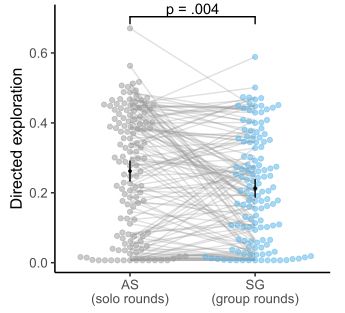
A plot showing the value of the directed exploration parameter within participant across condition (solo vs. group rounds). Directed exploration is significantly higher in solo than in group rounds.
6/7 Participants used social information as an exploration tool: when it was possible to learn from others, they reduced the amount of directed individual exploration they did -- this might be resource-rational, given that exploration has been found to be cognitively costly.
23.09.2024 10:44 — 👍 0 🔁 0 💬 1 📌 0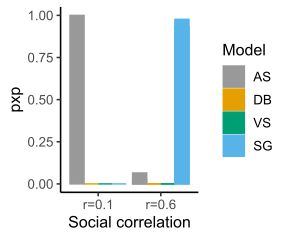
A plot showing the protected exceedance probability (a measure of model fit) across different social correlations. Asocial Learning is the best fitting model when social correlations are low (0.1), while Social Generalization is the best fitting model at correlations of 0.6.
5/7 Participants adjusted how much they relied on social information to the task -- when we lowered social correlations, they stopped using social information altogether.
23.09.2024 10:44 — 👍 0 🔁 0 💬 1 📌 0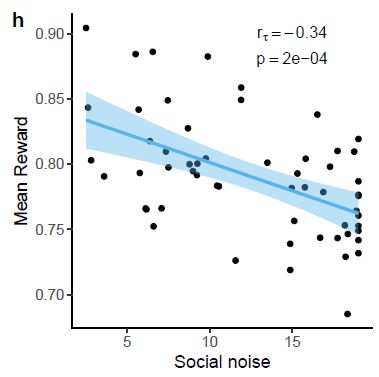
A plot showing the significant negative correlation between social noise (a parameter that is low when relying on social information) and mean reward.
4/7 Participants treated social information as noisy individual information, following the predictions of our Social Generalization model. They also performed better when they relied on social information, using it to their advantage.
23.09.2024 10:43 — 👍 0 🔁 0 💬 1 📌 0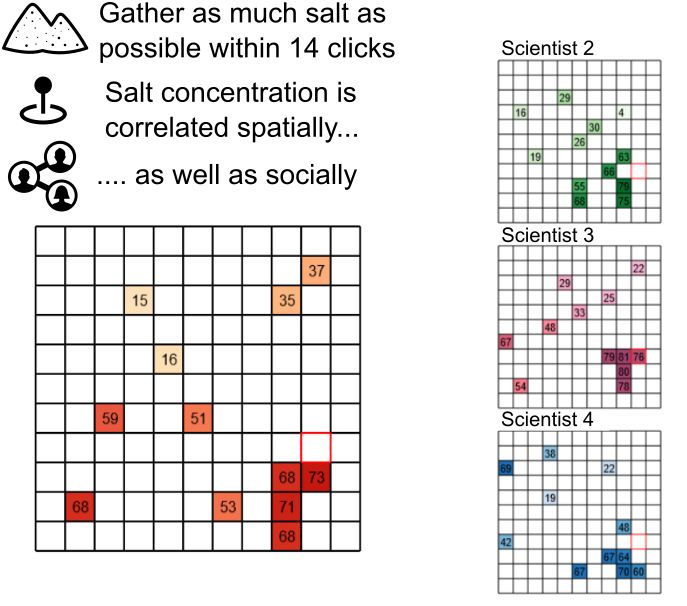
A screenshot of the socially correlated bandit task. Groups of 4 participants explore spatially correlated bandits, which are also socially correlated. They have a limited number of clicks to explore, and are trying to maximize their payoff.
3/7 To investigate how humans handle settings where preferences are non-identical, we ran 3 experiments using the socially correlated bandit -- a task in which social information is helpful, but imitation is not optimal.
23.09.2024 10:42 — 👍 0 🔁 0 💬 1 📌 02/7 In prior research on how we can computationally model social learning, participants and demonstrators generally shared the exact same goal, making imitation optimal. In real life, however, you might not want to blindly imitate any person you come across.
23.09.2024 10:41 — 👍 1 🔁 0 💬 1 📌 0